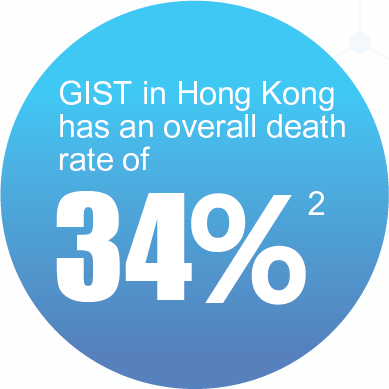
A New HopeFor Patients withGastrointestinal Stromal Tumor (GIST)
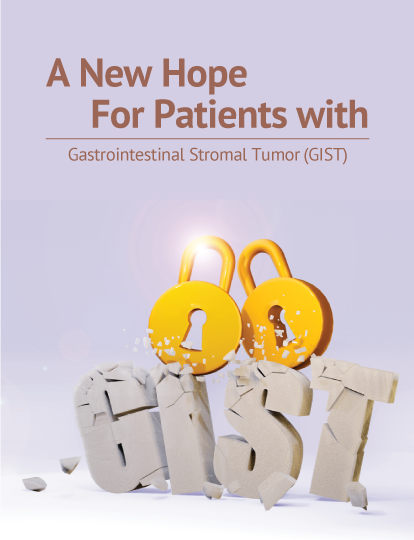

What Treatments are Available to GIST Patients?
GISTs have previously been documented to be resistant to conventional chemotherapies and tyrosine kinase inhibitors (TKIs) remain to be the preferred treatment for unresectable, metastatic, or recurrent disease.3
Treatment option varies according to the stage of disease:3
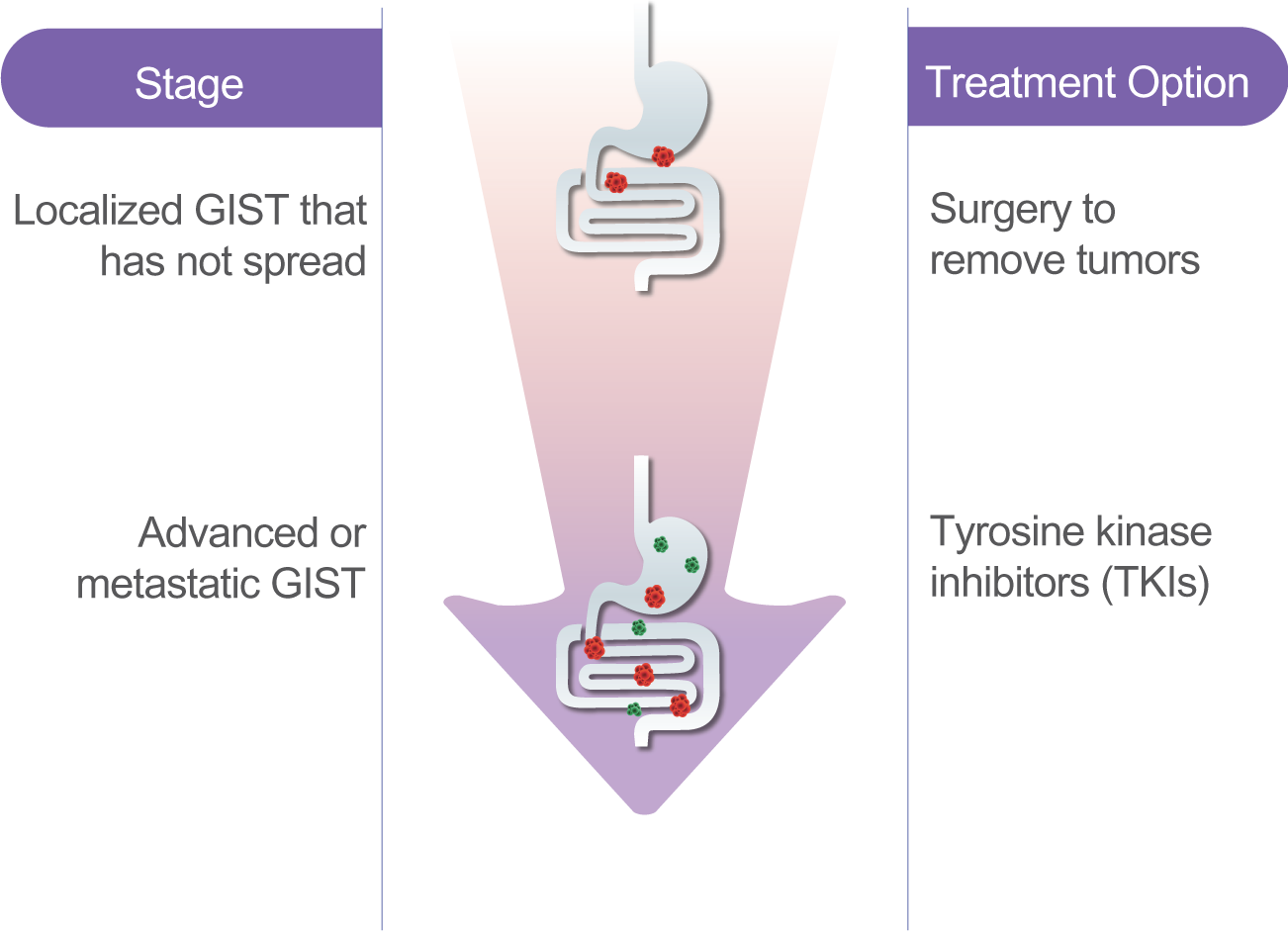
Determining Locally Advanced and Metastatic GIST…
Patients with a confirmed diagnosis of GIST are staged using the American Joint Committee on Cancer (AJCC) tumor, node, metastasis (TNM) staging system. 4
To determine whether or not the tumors are metastatic, computed tomography (CT) and/or magnetic resonance imaging (MRI) of the abdomen and pelvis will be performed.3 In cases of ambiguities, PET-CT imaging can be further performed.3
What are the Surgical Considerations?
The NCCN guidelines recommend that all GISTs ≥2 cm in size should be resected.3 Because the surgery aims for complete removal of the tumor(s), sometimes a small portion of the stomach or intestine may also be resected.5
While surgical resection is the treatment of choice for potentially resectable tumors, adjuvant therapy with TKI may be preferred if there is a risk of perforation, tumor rupture, or incomplete resection. 6
Unfortunately, fewer than half of GIST patients present with potentially resectable tumors, and postoperative recurrence or metastasis is seen in 40% to 90% of all cases treated surgically.6
Early-generation TKIs7 | TKIs that can inhibit mutated tyrosine kinase in GIST patients were being developed as targeted therapy and are considered the initial treatment options for patients. |
Next-generation TKIs7
| While the use of early-generation TKIs provides significant clinical benefit, the inevitable development of TKI resistance and disease progression limit patient survival. Fortunately, next-generation TKIs have been developed to specifically address these challenges. There are two next-generation TKIs available for GIST patients. The first one is a TKI that can target broad-spectrum mutations of KIT and PDGFRα. Its broad-spectrum nature enables it to handle different mutation variants. The second is a TKI which is specific for patients harbouring a PDGFRα mutation. |
Early-generation TKIs7 |
TKIs that can inhibit mutated tyrosine kinase in GIST patients were being developed as targeted therapy and are considered the initial treatment options for patients. |
Next-generation TKIs7 |
While the use of early-generation TKIs provides significant clinical benefit, the inevitable development of TKI resistance and disease progression limit patient survival. Fortunately, next-generation TKIs have been developed to specifically address these challenges. There are two next-generation TKIs available for GIST patients. The first one is a TKI that can target broad-spectrum mutations of KIT and PDGFRα. Its broad-spectrum nature enables it to handle different mutation variants. The second is a TKI which is specific for patients harbouring a PDGFRα mutation. |
Different GIST patients may harbour different mutations, so using the traditional generation TKIs as therapy options may not be able to target some specific mutations. Meanwhile, the new generation TKIs can target different variations of KIT and PDGFRα mutants to inhibit the growth of cancer cells. 7
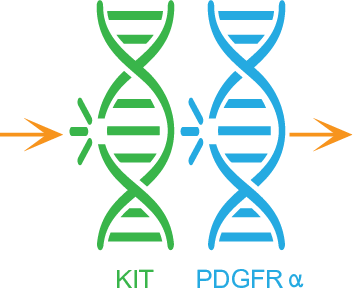
Hong Kong Pharmaceutical Care Foundation
Founded in 2007, the Hong Kong Pharmaceutical Care Foundation is a registered non-profit charitable organization. The foundation was founded by pharmacists who wish to provide pharmaceutical service and improve elderly medication use in old-age homes by using their expertise and professional knowledge.
Applicants must be a holder of a Hong Kong identification card and have a prescription issued by the doctor. For more information about requirements, please contact the foundation.
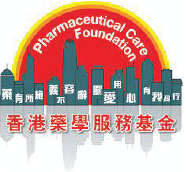
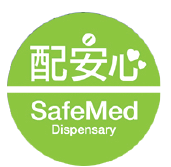


- Monday-Friday: 11:00-13:00; 14:00-17:00
- Room 1, Unit 703-704, CRE Centre, 889 Cheung Sha Wan Road, Lai Chi Kok, Kowloon
Local Supporting Organization
Hong Kong Anti-Cancer Society
- +852 3921 382130 Nam Long Shan Road, Wong Chuk Hang, Hong Kong
Hong Kong Liver Cancer and Gastrointestinal Cancer Foundation
- +852 3689 7596Hong Kong General Post Box 8190
Hong Kong Cancer Fund
- 2201-03, China United Centre 28 Marble Road, North Point
- Unit 2-8, Wing C, G/F Lung Cheong House, Lower Wong Tai Sin (II) Estate, Kowloon
- Unit 5, Ground Floor, The Center, 99 Queen’s Road Central, Hong Kong
- 3/F, TLP132, 132-134 Tai Lin Pai Road, Kwai Chung, New Territories
Contact Us
- Room 2301, 23/F. Island Place Tower, 510 King’s Road, North Point, Hong Kong
- General enquiry:[email protected]
- Room 2301, 23/F. Island Place Tower, 510 King’s Road, North Point, Hong Kong
- General enquiry:
[email protected]
References1. Census and Statistics Department. Year-end population for 2020. Available at: https://gia.info.gov.hk/general/202102/18/P2021021800322_361132_1_1613634467072.pdf [Accessed 16 Jun 2021]. 2. Chan KH, Chan CW, Chow WH, et al. World J Gastroenterol. 2006;12:2223-8. 3. NCCN Clinical Practice Guidelines in Oncology (NCCN Guidelines®). Soft Tissue Sarcoma. Version 2.2021. Plymouth Meeting, PA (United States): National Comprehensive Cancer Network, Inc.; 2021 January 14. 4. DeMatteo RP, Maki RG, Agulnik M, et al. Gastrointestinal stromal tumor. In: AJCC Cancer Staging Manual, 8th ed, Amin MB (Ed), AJCC, Chicago 2017. p.523. Corrected at 4th printing, 2018. 5. Aparicio T, Boige V, Sabourin JC, et al. Eur J Surg Oncol. 2004;30:1098-103. 6. Eisenberg BL, Judson I. Ann Surg Oncol. 2004;11:465-75. 7. Bauer S, George S, von Mehren M, et al. Front Oncol. 2021;11:672500.

Room 2301, 23/F, Island Place Tower,
510 King’s Road, North Point, Hong Kong.
Tel: 3844 8100 Fax: 3844 8188HK-QIN-202108-01




